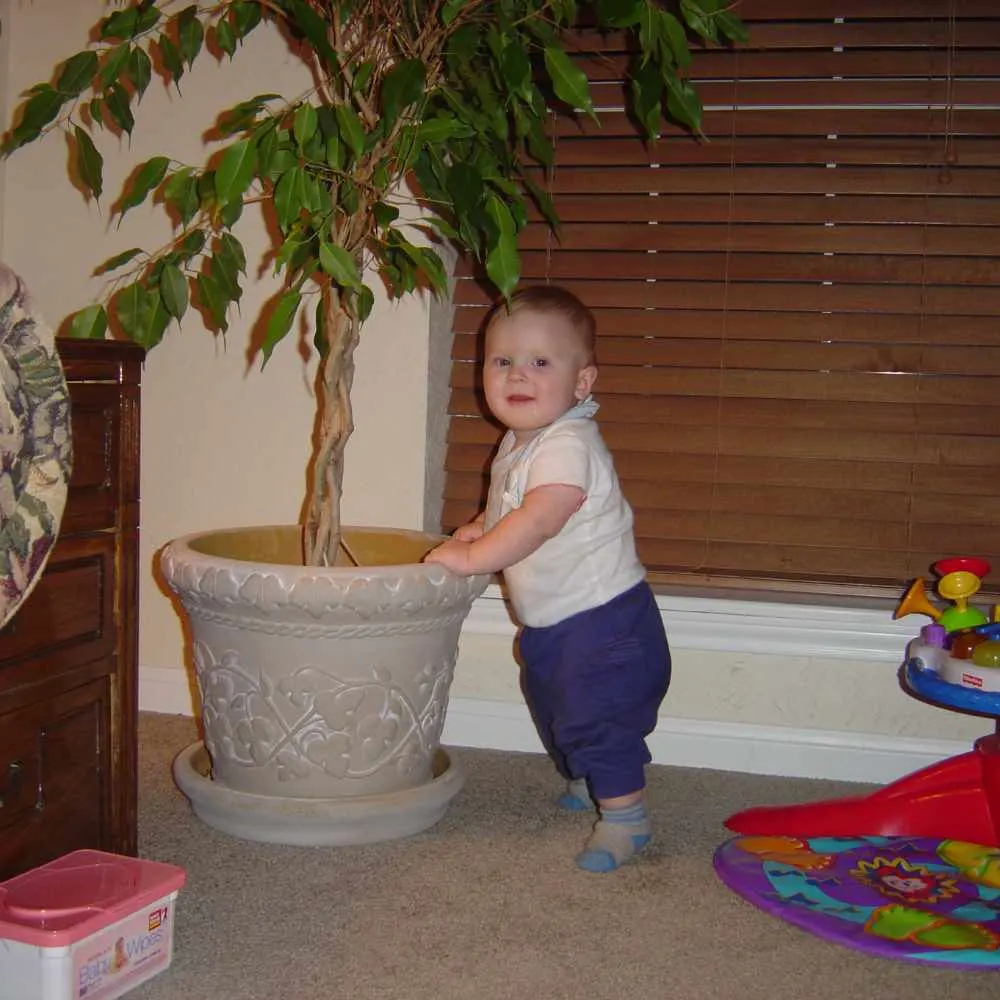- Clay Moon Phase Wall Hanging - July 4, 2023
- What To Do When a Toddler Won’t Keep Their Blanket On - June 10, 2023
- How Do Child Locks Work in Cars? (And When To Use Them!) - June 10, 2023
Dealing with a toddler who will not respond to “no” can be challenging and frustrating for any parent. It pushes you to the limits, triggers anger, and you cannot fathom what it will take the little one to listen to you.
When a toddler does not respond to “no,” you must become innovative to reduce the power struggle, stop the disobedience, and, most importantly, avoid arguing with your toddler because you will both end up in tears. Instead, remain calm, pick your battles, and enforce limits.
Many parents struggle with toddlers who will not take no for an answer. Follow these practical strategies to set and enforce boundaries with your toddler.

What To Do When Your Toddler Does Not Respond to “No”
Often, parents try to reason with the child to get the toddler to cooperate. Toddlers are not able to reason well, just yet, and instead should be given clear instructions and consequences if they do not cooperate.
Here is how to stop over-explaining and over-negotiating and get your little one to respond to “no.”
Pick Your Battles
Your child will disregard the “no” if you always say it. Make sure when you say “no,” you mean it. A toddler cannot understand boundaries without consistency.
Define what is essential, set limits, and include appropriate consequences. Ease up on the little annoying, but otherwise minor things. Your child will most likely outgrow those minor habits without you forcing them to behave in a particular way (source).
It is not such a big deal for your child to have a different opinion and personality, so allow flexibility and space for your toddler’s individuality (source). If your toddler wants to wear a Batman costume to the grocery store, let him!
Validate Their Feelings
It is critical to respond to your child’s behavior with empathy and validate their feelings; however, parents often skip the validation and go straight to setting limits. Acknowledging your child’s feelings is vital because it lets them know their feelings matter.
Using empathy and validation will help you appreciate your child’s feelings, help them to calm down, and make them aware of their emotions and how to manage them. Keep the language simple, short, and clear, but not threatening. When you do not validate their feelings, they may throw tantrums to show you they are upset and cannot learn to choose their reaction to big emotions as the grow. (source).
Keep Calm and Avoid Shouting
If you shout at your child, they will think you are equals and on the same level, which negates your authority. Shouting does not work because the child will only learn aggressive ways of responding to correction, and this will cause more problems as your child interacts with more and more people as they age. (source). Do not underestimate the fundamentals of personal interaction you are teaching your child on a daily basis.
Follow Through With Consequences
Putting your foot down will establish the limits, and your child will only learn if you follow through with consequences. Empty threats weaken your authority, and your child learns to continue misbehaving because the repercussions never happen. Although keeping your word will not win you short-term favor, it will reinforce your child’s trust in you, due to consistency.
Consider a time-out if your toddler does not respond to “no.” The suitable duration is a minute for every year of their life. Before imposing the time out, warn them sternly but calmly.
For example, “I will count to three, and if you do not stop, I will put you in time-out.” If the child does not listen, take them to the time-out spot and set a timer. When the time is up, reiterate to the child why they were placed in time-out, but let them know you are not angry (source).

Know the Triggers and Intentions
You can prevent some misbehavior by anticipating the triggers and either removing tangible attractions or developing a strategy in advance. For example, if your toddler likes knocking items off of a shelf, you can move them to a higher one.
It helps to give toddlers time to adapt to new experiences and transitions. For example, if playtime is almost over, you can say, “You will need to tidy up in a few minutes and prepare for bed.” Your child is less likely to fuss if they feel ready for the changes.
It helps to determine why your child is not responding to your warnings. It could be that your child is still playing with their new toy because they are excited about it. Pause before reacting, to establish why your child seems to ignore you.
Explain Things After the Tantrum Is Over
Once a tantrum begins, the child is beyond logic, and there is no point in trying to reason with them. Instead, be there through the outburst and wait until the child is calm, hug them, and empathize with their emotions. Once they settle down, you can talk, and they will be able to listen and process your words.
You can coach your child if “no” is particularly frustrating for them. For example, you can say, “If you do not like ‘no’ and it upsets you, go do something that helps you to calm down.” With such an approach, your child will learn no means no, even if they do not like it, and how to redirect and self-soothe themself(source).
Avoid Giving In and Walk Away From Nagging
If you surrender to your child’s disobedience, the child learns they only need to push hard enough to get what they want. It will also make it difficult for you to enforce any limits.
When your child does not stop nagging, arguing, or crying, you can firmly say, “ I will not talk about this again,” and then walk away. When you give in to your child’s temper tantrums, they learn to challenge your authority. They know that if they act out, you will give in, and they will always use these tactics whenever they want to get away with something.
Final Thoughts
Toddlers are little humans that learn fast and grow fast. You are laying a foundation for your child to use as a basis for all their relationships, so choose wisely and pick your battles, enforce limits, and be consistent. Also, remember to allow for personality attributes outside of your own.
You may have a budding artist, a musician, or a bookworm and wonder how this little person ever came from you. With time and patience, your child will learn to obey and understand the acceptable boundaries you set within your family.
Author Notes:
Teresa is a Registered Nurse in the State of Texas and the mother of two. Opinions and insights on childcare are based on professional knowledge, academic research, and personal experience.
Recommended Reading:
- How Long Does a 2-Year-Old’s Memory Last?
- Should You Give a Toddler Milk Before Breakfast?
- Keeping Toddlers Busy (Not Destroying Your House)
Make Your Own Beautiful Living Succulent Wreath Centerpiece! Complete video course by Jeannine Romero now available through Skillshare.
